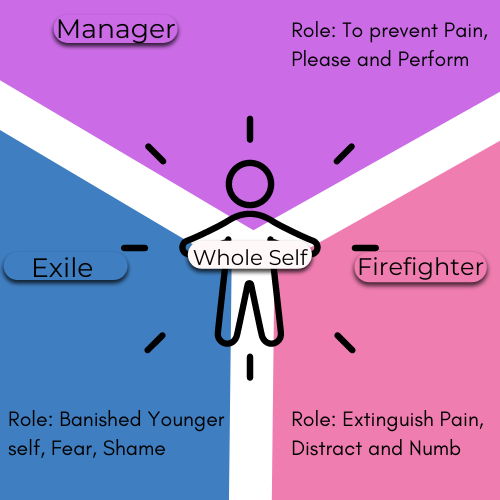The founder of Internal Family Systems (IFS) a model of psychotherapy, and founder of the IFS Institute is Dr. Richard Schwartz.
IFS understand parts as a kind of ‘subpersonality’, they interact internally through specific styles, patterns and sequences: a system. We can experience our parts through feelings: for example, a part that knows you were once hurt by being out of control might jump into action by making you feel anxious, alert and hypervigilant, or it might make you want to plan ahead in a way others might find excessive.
Usually in our day to day, our whole self, is made up of slightly varying parts. The part of us that presents itself when we have a first date is slightly different to the part we present at work to colleagues, which is likely more different again to the part we present to friends and family.
Internal Family Systems ‘parts’
Managers: These are what likely surface most often, they intervene and run the life of a person on a day-to-day basis. Their characteristics are in the name, they manage and are often obsessed about being in control of every situation or relationship. They enact this control through a number of guises: criticising and terrorising is a common trait for a manager, many people would call this their ‘inner critic’. Another common guise is that of a caretaker, they can come across as nurturing and caring, when in actuality they are still acting out of fear. It is also essential to understand that although a manager might seem more adult, they were created at the same time as the exiles.
Firefighters: These are the reactive and most extreme parts that surface when an exile is activated. Their role is similar to the manager, but only kicks into gear when the usual management and controlling tactics don’t work. Their extreme reactions in an effort to repress the exiles can look like: drug or alcohol use, self-harm, binge-eating, promiscuity.
Exiles: These are often the parts that all others rush around to protect, or to repress. They’re frequently young, or even infant parts who have experienced some kind of trauma. This trauma doesn’t have to be what many would consider ‘extreme’, such as abuse.
They are called exiles because other parts might isolate them. They’re associated with feelings of pain, terror and fear. However, the longer these parts are exiled, the more extreme and desperate they can get: remember these parts are often formed as a child when an individual has undergone trauma, they need to be listened to.

There are no “bad” parts’ and that ‘the goal of therapy is not to eliminate parts but instead to help them find their non-extreme roles’.
We can also experience our parts through thoughts, sensations and images. A part might surface as distrust in the form of a thought, or a tingling or sickness feeling in the form of a sensation, or you might suddenly remember something from long ago.
How does Internal Family Systems Therapy Work?
A common practice in IFS involves visualization, where clients are guided to a mental space to interact with different parts of themselves.
Other common forms of practice in IFS are: actively using the IFS model language to relate to and conceptualise parts, journaling, writing exercises as a part, sensing a part of the body relating to a part and journaling.
The person in therapy will come to understand and accept that all these ways in which we experience our parts, are coming from a good place. Although the end result might seem, on the surface, inconvenient or unpleasant, often the motive behind the function of a part is simply to protect a version of a person who was unable to protect themselves, often a young child.



